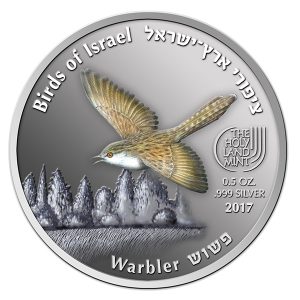The first four coins in an eight-coin set celebrating “Birds of Israel” have been issued by the Israel Coins and Medals Corp.
Each of the coins is struck in .999 per cent silver with a weight of half an ounce. The coins’ common reverse depicts Israel at the centre of the world as seen from a satellite map. Around the border, the angles and directions of a compass, symbolizing the “inner compass” of birds that directs them to the Israel.
The hoopoe (Upupa epops)—winner of the “Israel National Bird Elections” held by the Society for the Protection of Nature in Israel—was the series’ first issue. With its majestic crown and appearance, the hoopoe is one of the common birds in Israel found in home gardens and lawns. While its body is coloured with shades of brown, its wings and tail stand out with their black and white stripes. The hoopoe measures about 30 centimetre in length with a 45-centimetre wingspan, a 90-gram weight and a long, thin beak.
The hoopoe nests in Israel in hollows in rocks or in holes in tree trunks. The female lays upwards of eight eggs, and the young stay in the nest for about 25 days, reaching full maturity a year after hatching. Hoopoes feed on worms and insects.
The hoopoe, or “duchifat” in Hebrew, is mentioned several times in Jewish sources. Its exact identity has been questioned by our Sages and referred to in Hebrew as “tarnegol habar” (wild rooster) or “nagar tura” in Aramaic (carpenter of the mountain).
The obverse depicts a hoopoe feeding its young in the bark of a tree by means of its long beak. Inscriptions in English and Hebrew include “Birds of Israel” and “Hoopoe,” the Holy Land Mint logo, the metal fineness, weight and year-date.
SECOND COIN
The warbler (Prinia gracilis), one of the smallest of the singing birds in Israel, is one of its common birds. Its colours are brownish gray and its back is striped. It is found in trees and bushes in which it builds its nest. With its long tail, it moves very quickly between the branches. The warbler feeds on small insects, seeds and fruit. Its body measures about 12 centimetres, its wingspan is about 4 centimetres and its weight is about seven grams.
Warblers are found in couples throughout the year and the male defends the couple’s territory. The female lays up to five eggs that are coloured pink with reddish marks. Their nests are pear-shaped, and the young birds stay in the nest for nearly two weeks.
The obverse depicts a warbler flying over trees and grass. “Birds of Israel” and “Warbler,” the Holy Land Mint logo, metal fineness, weight and year-date also appear on the obverse.
THIRD COIN
The griffon vulture (Gyps fulvus) is a large bird of prey and an endangered species which nests in mountainous areas on cliff ledges. One of the biggest vulture nesting areas in Israel is on the Gamla cliffs in the north of Israel. With a wingspan of up to 2.5 meters, the vulture soars to great heights in search of food, feeding on carcasses of dead animals.
The obverse depicts a vulture flying over a rocky cliff.

Lastly, the lesser kestrel appears on the fourth coin. An addition four coins are slated for release.
FOURTH COIN
The lesser kestrel (Falco naumanni) is a small falcon and bird of prey. It feeds on invertebrates and insects and nests in hilly areas or in roof tops, close to open areas where it finds its prey. Conservation projects are underway to save this threatened species, whose areas of prey are diminishing.
The obverse depicts a lesser kestrel flying over a roof.



